高二上学期英语语法总结要点
高二英语重点语法知识点总结归纳5篇
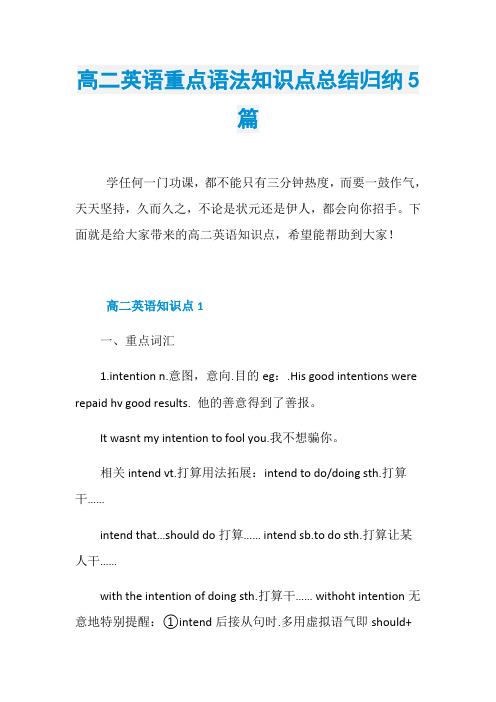
高二英语重点语法知识点总结归纳5篇学任何一门功课,都不能只有三分钟热度,而要一鼓作气,天天坚持,久而久之,不论是状元还是伊人,都会向你招手。
下面就是给大家带来的高二英语知识点,希望能帮助到大家!高二英语知识点1一、重点词汇1.intention n.意图,意向.目的eg:.His good intentions were repaid hv good results. 他的善意得到了善报。
It wasnt my intention to fool you.我不想骗你。
相关intend vt.打算用法拓展:intend to do/doing sth.打算干……intend that…should do打算…… intend sb.to do sth.打算让某人干……with the intention of doing sth.打算干…… withoht intention无意地特别提醒:①intend后接从句时.多用虚拟语气即should+动词原形;②intend,sb.to do sth.通常用在被动语态中;③intend 的过去式表示“原打算……”。
案例剖析旁征博引举一反三考题1 (典型例题分)This book, as a surprise for his sisterwas lost in the mail.A.intendedB.regardedC.takenD.recognized2.absence n.不在,缺席;缺乏eg oI soon noticed his absence from school.我很快便察觉到他缺课了。
After an absence of seven years,1 went home.外出7年后我返回了故乡。
相关absent adj.缺席的;不在的用法拓展:be absent from不在.缺席absence of mind心不在焉during ones absence在某人外出期间in ones absence—inthe absence of sb.某人不在时,某人外出时特别提醒:be absent ftom短语中用from。
高二上语法知识点归纳总结

高二上语法知识点归纳总结高二上学期,语法知识的学习和应用是学生们英语学习的重点之一。
通过对语法知识的系统学习和实践运用,可以提高学生的英语语言能力和表达能力。
本文将对高二上学期英语语法知识点进行归纳总结,以便学生们复习和巩固。
一、时态和语态1. 一般现在时一般现在时表示当前的状态、经常性的动作或真理。
它的基本结构是主语 + V原 + 其他。
2. 一般过去时一般过去时表示过去发生的动作或状态。
它的基本结构是主语 + V过去式 + 其他。
3. 一般将来时一般将来时表示将来发生的动作或状态。
它的基本结构是主语 +will + V原 + 其他。
4. 现在进行时现在进行时表示现在正在进行的动作。
它的基本结构是主语 +am/is/are + Ving + 其他。
5. 过去进行时过去进行时表示过去某一时间正在进行的动作。
它的基本结构是主语 + was/were + Ving + 其他。
6. 现在完成时现在完成时表示过去发生的动作对现在产生的影响或结果。
它的基本结构是主语 + have/has + V过去分词 + 其他。
7. 过去完成时过去完成时表示过去某一时间发生的动作在过去的某一时刻之前已经完成。
它的基本结构是主语 + had + V过去分词 + 其他。
8. 被动语态被动语态表示动作的承受者出现在句首,强调动作的接收者或发生者不重要。
它的基本结构是主语 + am/is/are/was/were + V过去分词 + 其他。
二、从句1. 定语从句定语从句用来修饰名词或代词,一般由关系代词(who,whom,whose,which,that)引导。
2. 状语从句状语从句用来修饰句子的动作或状态,一般由连词(although,because,if,since等)引导。
3. 名词性从句名词性从句用作句子的主语、宾语、表语或同位语,一般由连接词(that,whether,if,what,where,how等)引导。
三、倒装1. 完全倒装完全倒装用于以副词here,there或表示方向的副词(up,down,out等)开头的句子中,或者以表示否定意义的词(never,not,hardly 等)开头的句子中。
高二英语知识点归纳整理语法知识点总结

高二英语知识点归纳整理语法知识点总结高二英语的语法知识点众多,掌握这些知识点对于提升英语水平至关重要。
以下是对高二英语语法知识点的详细归纳整理。
一、动词时态和语态1、一般过去时表示过去某个时间发生的动作或存在的状态,常与表示过去的时间状语连用,如 yesterday, last week, in 1990 等。
其结构为:主语+动词的过去式+其他。
2、过去进行时表示过去某个时刻或某段时间正在进行的动作,常与 at that time, this time yesterday 等时间状语连用。
其结构为:主语+ was/were +动词的现在分词+其他。
3、现在完成时表示过去发生的动作对现在造成的影响或结果,或者从过去开始一直持续到现在的动作或状态。
常与 already, yet, just, ever, never, for +时间段, since +时间点等连用。
其结构为:主语+ have/has +动词的过去分词+其他。
4、过去完成时表示在过去某个时间或动作之前已经完成的动作,即“过去的过去”。
常与 by +过去的时间点, before +过去的时间点等连用。
其结构为:主语+ had +动词的过去分词+其他。
5、一般将来时表示将来要发生的动作或存在的状态,常与 tomorrow, next week, in the future 等时间状语连用。
其结构为:主语+ will +动词原形或者主语+ be going to +动词原形。
6、将来进行时表示将来某个时刻正在进行的动作,常与 at this time tomorrow 等时间状语连用。
其结构为:主语+ will be +动词的现在分词。
7、被动语态当句子的主语是动作的承受者时,要用被动语态。
其结构为:be +动词的过去分词。
不同时态的被动语态形式不同,需要根据具体时态进行变化。
二、非谓语动词1、动词不定式具有名词、形容词和副词的特征,可以在句中作主语、宾语、定语、状语和宾语补足语等。
高二英语重点语法知识点总结归纳5篇

高二英语重点语法知识点总结归纳5篇学任何一门功课,都不能只有三分钟热度,而要一鼓作气,天天坚持,久而久之,不论是状元还是伊人,都会向你招手。
下面就是给大家带来的高二英语知识点,希望能帮助到大家!高二英语知识点1一、重点词汇1.intention n.意图,意向.目的eg:.His good intentions were repaid hv good results. 他的善意得到了善报。
It wasnt my intention to fool you.我不想骗你。
相关intend vt.打算用法拓展:intend to do/doing sth.打算干……intend that…should do打算…… intend sb.to do sth.打算让某人干……with the intention of doing sth.打算干…… withoht intention无意地特别提醒:①intend后接从句时.多用虚拟语气即should+动词原形;②intend,sb.to do sth.通常用在被动语态中;③intend 的过去式表示“原打算……”。
案例剖析旁征博引举一反三考题1 (典型例题分)This book, as a surprise for his sisterwas lost in the mail.A.intendedB.regardedC.takenD.recognized2.absence n.不在,缺席;缺乏eg oI soon noticed his absence from school.我很快便察觉到他缺课了。
After an absence of seven years,1 went home.外出7年后我返回了故乡。
相关absent adj.缺席的;不在的用法拓展:be absent from不在.缺席absence of mind心不在焉during ones absence在某人外出期间in ones absence—inthe absence of sb.某人不在时,某人外出时特别提醒:be absent ftom短语中用from。
高二英语语法知识点总结
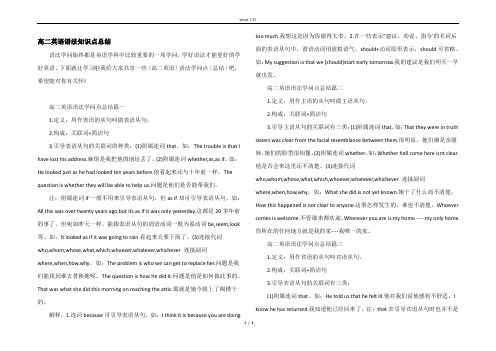
高二英语语法知识点总结语法学问始终都是英语学科中比较重要的一项学问,学好语法才能更好的学好英语。
下面就让学习啦我给大家共享一些〔高二英语〕语法学问点〔总结〕吧,希望能对你有关怀!高二英语语法学问点总结篇一1.定义:用作表语的从句叫做表语从句。
2.构成:关联词+简洁句3.引导表语从句的关联词的种类:(1)附属连词that。
如:The trouble is that I have lost his address.麻烦是我把他的地址丢了。
(2)附属连词whether,as,as if。
如:He looked just as he had looked ten years before.他看起来还与十年前一样。
The question is whether they will be able to help us.问题是他们是否能帮我们。
注:附属连词if一般不用来引导表语从句,但as if却可引导表语从句,如:All this was over twenty years ago,but its as if it was only yesterday.这都是20多年前的事了,但宛如昨天一样。
能跟表语从句的谓语动词一般为系动词be,seem,look 等。
如:It looked as if it was going to rain.看起来天要下雨了。
(3)连接代词who,whom,whose,what,which,whoever,whatever,whichever 连接副词where,when,how,why。
如:The problem is who we can get to replace her.问题是我们能找到谁去替换她呢。
The question is how he did it.问题是他是如何做此事的。
That was what she did this morning on reaching the attic.那就是她今晨上了阁楼干的。
高二英语语法必考知识点总结通用8篇
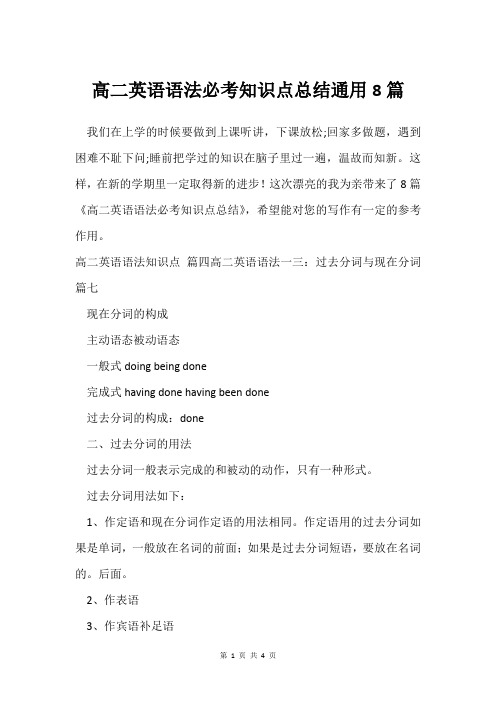
高二英语语法必考知识点总结通用8篇我们在上学的时候要做到上课听讲,下课放松;回家多做题,遇到困难不耻下问;睡前把学过的知识在脑子里过一遍,温故而知新。
这样,在新的学期里一定取得新的进步!这次漂亮的我为亲带来了8篇《高二英语语法必考知识点总结》,希望能对您的写作有一定的参考作用。
高二英语语法知识点篇四高二英语语法一三:过去分词与现在分词篇七现在分词的构成主动语态被动语态一般式doing being done完成式having done having been done过去分词的构成:done二、过去分词的用法过去分词一般表示完成的和被动的动作,只有一种形式。
过去分词用法如下:1、作定语和现在分词作定语的用法相同。
作定语用的过去分词如果是单词,一般放在名词的前面;如果是过去分词短语,要放在名词的。
后面。
2、作表语3、作宾语补足语4、作状语三、现在分词的用法1、作定语作定语用的分词如果是单词,一般放在名词的前面。
如果是分词短语,一般放在名词的后面,它的功用相当于定语从句。
2、作表语3、作宾语补足语分词在复合宾语中可作宾语补足语。
可带这种复合宾语的动词有:see, watch, hear, feel, find, get, keep等。
注1:上述句子也可以变为被动式。
如:Steam can be seen rising from the wet clothes.注2:复合宾语中用现在分词和用不定式意义稍有不同。
不定式表示动作发生了,指事物的全过程;分词则表示动作正在进行。
Fortune often rewards with interest those that have patience to wait for her.这是一句英文谚语意思是只要有耐心,总会走好运。
高二英语语法二:倒装篇八1、在there be/live/lie句型中用全部倒装:2、在以there, here, now, then +be/come/go+主语的句子中用全部倒装:注:如果主语是代词则不用倒装。
高二英语上学期知识点
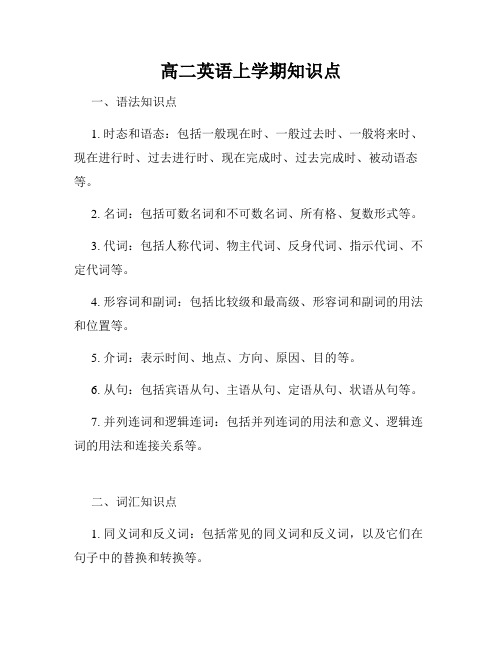
高二英语上学期知识点一、语法知识点1. 时态和语态:包括一般现在时、一般过去时、一般将来时、现在进行时、过去进行时、现在完成时、过去完成时、被动语态等。
2. 名词:包括可数名词和不可数名词、所有格、复数形式等。
3. 代词:包括人称代词、物主代词、反身代词、指示代词、不定代词等。
4. 形容词和副词:包括比较级和最高级、形容词和副词的用法和位置等。
5. 介词:表示时间、地点、方向、原因、目的等。
6. 从句:包括宾语从句、主语从句、定语从句、状语从句等。
7. 并列连词和逻辑连词:包括并列连词的用法和意义、逻辑连词的用法和连接关系等。
二、词汇知识点1. 同义词和反义词:包括常见的同义词和反义词,以及它们在句子中的替换和转换等。
2. 词组和搭配:包括常见的固定搭配、短语动词、习惯用语等。
3. 常用短语和惯用表达:包括口语中常用的短语和表达方式。
4. 词性转换:包括动词、名词、形容词和副词之间的转换和派生。
三、阅读理解1. 阅读技巧:包括快速阅读、精读和略读的技巧和策略。
2. 主旨大意题:根据文章的段落结构和关键信息,确定文章的主题和主旨。
3. 细节理解题:根据文章中的具体细节和细节信息,回答相关问题。
4. 推理判断题:根据文章中暗示和推理,进行合理推断和判断。
5. 词汇理解题:根据上下文语境,理解和推测词语的含义。
6. 表达方式题:分析作者的观点、态度和写作目的,并解释其表达方式。
四、写作技巧1. 写作结构:包括文章的引言、主体和结论部分。
2. 表达逻辑:合理组织语句和段落,使文章的表达逻辑清晰。
3. 连贯衔接:使用适当的过渡词和连接词,使句子和段落之间衔接自然。
4. 词汇运用:使用准确、丰富的词汇表达意思。
5. 句子结构:使用多样化的句子结构,使文章有韵律感和变化。
6. 修辞手法:使用比喻、拟人、排比等修辞手法,使文章更生动、形象。
以上是高二英语上学期的知识点概述,希望对你有所帮助。
高二上学期英语语法知识点

高二上学期英语语法知识点一、句子成分1. 主语(Subject)- 在句子中承担动作的实施者或是受动作影响的人或物。
- 例句:Tom is playing basketball.2. 谓语(Predicate)- 对主语进行说明、描绘或叙述,一般由动词或者动词短语构成。
- 例句:She enjoys reading books.3. 宾语(Object)- 句子中受动作影响的人或物。
- 例句:He bought a new car.4. 表语(Predicative)- 对主语进行补充说明,常用的词包括形容词、名词、过去分词等。
- 例句:The cake tastes delicious.5. 定语(Attributive)- 修饰名词或代词的词语,用于描述或限定名词或代词的特点。
- 例句:I have a blue pen.6. 状语(Adverbial)- 修饰动词、形容词、副词、全句或句子成分。
- 例句:He runs fast.7. 补语(Complement)- 在句子中充当主语、宾语、表语等成分的补充,用于补充完整句子的意义。
- 例句:She became a doctor.二、时态与语态1. 时态- 用于表示动作或状态发生的时间,常见的时态有一般现在时、一般过去时、一般将来时等。
- 例句:I study English every day.2. 语态- 句子所表达的动作发出者与受动者的关系,常见的语态有主动语态和被动语态。
- 例句:The book was written by him.三、从句1. 名词性从句- 在句子中充当名词的从句,可以作主语、宾语、表语等。
- 例句:What he said surprised me.2. 定语从句- 用于修饰名词或代词的从句,对名词或代词进行进一步的说明或描述。
- 例句:The book that I borrowed from the library is very interesting.3. 状语从句- 用于修饰动词、形容词、副词的从句,表示时间、地点、原因、结果等。
高二英语语法知识点归纳
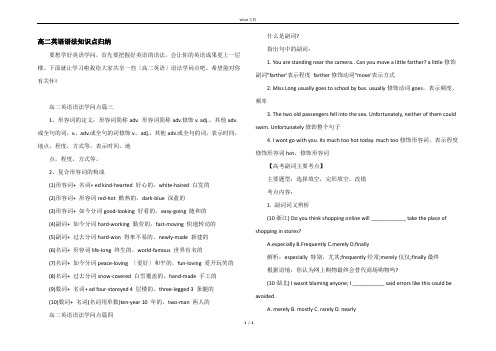
高二英语语法知识点归纳要想学好英语学问,首先要把握好英语的语法,会让你的英语成果更上一层楼。
下面就让学习啦我给大家共享一些〔高二英语〕语法学问点吧,希望能对你有关怀!高二英语语法学问点篇三1、形容词的定义:形容词简称adv. 形容词简称adv.修饰v. adj.,其他adv.或全句的词,v.,adv.或全句的词修饰v.,adj.,其他adv.或全句的词,表示时间,地点,程度,方式等。
表示时间,地点,程度,方式等。
2、复合形容词的构成(1)形容词+ 名词+ ed kind-hearted 好心的,white-haired 白发的(2)形容词+ 形容词red-hot 酷热的,dark-blue 深蓝的(3)形容词+ 如今分词good-looking 好看的,easy-going 随和的(4)副词+ 如今分词hard-working 勤劳的,fast-moving 快速转动的(5)副词+ 过去分词hard-won 得来不易的,newly-made 新建的(6)名词+ 形容词life-long 终生的,world-famous 世界有名的(7)名词+ 如今分词peace-loving 〔爱好〕和平的,fun-loving 爱开玩笑的(8)名词+ 过去分词snow-covered 白雪覆盖的,hand-made 手工的(9)数词+ 名词+ ed four-storeyed 4 层楼的,three-legged 3 条腿的(10)数词+ 名词(名词用单数)ten-year 10 年的,two-man 两人的高二英语语法学问点篇四什么是副词?指出句中的副词:1. You are standing near the camera.. Can you move a little farther? a little修饰副词"farther'表示程度farther修饰动词"move'表示方式2. Miss Long usually goes to school by bus. usually修饰动词goes,表示频度、频率3. The two old passengers fell into the sea. Unfortunately, neither of them could swim. Unfortunately修饰整个句子4. I wont go with you. Its much too hot today. much too修饰形容词,表示程度修饰形容词hot,修饰形容词【高考副词主要考点】主要题型:选择填空,完形填空,改错考点内容:1. 副词词义辨析(10浙江) Do you think shopping online will ____________ take the place of shopping in stores?A.especiallyB.FrequentlyC.merelyD.finally解析:especially 特别,尤其;frequently经常;merely仅仅;finally最终根据语境:你认为网上购物最终会替代商场购物吗?(10湖北) I wasnt blaming anyone; I ___________ said errors like this could be avoided.A. merelyB. mostlyC. rarelyD. nearly解析:mostly 大部分地,通常地;nearly 几乎=almost;rarely 很少地,几乎不;merely 仅仅,只不过全句意思:我并没有责怪任何人,我只是说类似这种错误是可以避开的' 说类似这种错误是可以避开的'。
高二上学期英语知识点

高二上学期英语知识点一、语法知识点1. 时态与语态在高二上学期英语中,我们学习了各种时态的用法,包括一般现在时、一般过去时、一般将来时、现在进行时、过去进行时等。
我们学习了如何正确运用这些时态来描述不同的动作或状态。
此外,还学习了被动语态的构成和用法。
2. 从句高二上学期英语中,从句是一个重要的语法知识点。
我们学习了名词性从句、定语从句和状语从句的用法和结构。
学习了如何通过从句来丰富句子的表达,使句子更加准确、连贯。
3. 并列连词与从属连词高二上学期英语中,我们学习了并列连词和从属连词的用法。
并列连词用来连接并列的句子或短语,如and、but、or等;从属连词用于引导从句,如because、although、unless等。
正确使用这些连词可以帮助我们更好地表达自己的意思。
二、词汇知识点1. 常用词汇在高二上学期英语中,我们学习了大量的常用词汇,如名词、动词、形容词和副词等。
我们通过课堂学习和词汇积累来提高自己的词汇量,以便更好地理解和运用英语。
2. 词义辨析高二上学期英语中,我们学习了一些词义相近但用法不同的词汇,如think、believe、suppose等;或者一些近义词的区别,如funny和interesting、big和large等。
学习这些词汇的区别可以帮助我们更准确地表达自己的思想和意图。
三、阅读技巧1. 主旨理解在高二上学期英语中,我们学习了如何通过阅读理解来获取文章的主旨。
通过分析文章的标题、首尾段和关键词,我们可以更好地理解文章的核心内容。
2. 推理判断高二上学期英语中,我们学习了通过上下文的线索来进行推理判断。
通过抓住文章中的关键信息和上下文的逻辑关系,我们可以推断出一些隐含的信息和作者的观点。
3. 词汇理解在阅读中,我们经常会遇到一些生词或不熟悉的词汇。
在高二上学期英语中,我们学习了如何通过上下文的线索来猜测词汇的意思,以便更好地理解文章。
四、写作技巧1. 写作结构高二上学期英语中,我们学习了常见的写作结构,如五段式写作结构,包括引言、论点1、论点2、论点3和结论。
高二英语语法重点知识点整理归纳5篇
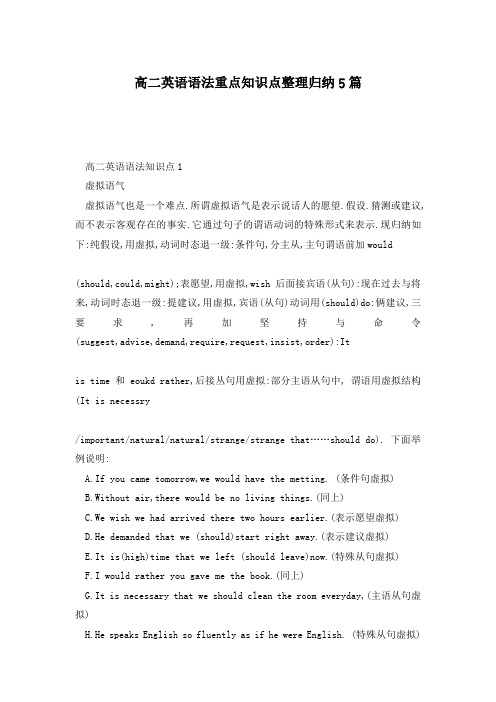
高二英语语法重点知识点整理归纳5篇高二英语语法知识点1虚拟语气虚拟语气也是一个难点.所谓虚拟语气是表示说话人的愿望.假设.猜测或建议,而不表示客观存在的事实.它通过句子的谓语动词的特殊形式来表示.现归纳如下:纯假设,用虚拟,动词时态退一级:条件句,分主从,主句谓语前加would(should,could,might);表愿望,用虚拟,wish后面接宾语(从句):现在过去与将来,动词时态退一级:提建议,用虚拟,宾语(从句)动词用(should)do:俩建议,三要求,再加坚持与命令(suggest,advise,demand,require,request,insist,order):Itis time和eoukd rather,后接丛句用虚拟:部分主语从句中, 谓语用虚拟结构(It is necessry/important/natural/natural/strange/strange that……should do). 下面举例说明:A.If you came tomorrow,we would have the metting. (条件句虚拟)B.Without air,there would be no living things.(同上)C.We wish we had arrived there two hours earlier.(表示愿望虚拟)D.He demanded that we (should)start right away.(表示建议虚拟)E.It is(high)time that we left (should leave)now.(特殊从句虚拟)F.I would rather you gave me the book.(同上)G.It is necessary that we should clean the room everyday,(主语从句虚拟)H.He speaks English so fluently as if he were English. (特殊从句虚拟)高二英语语法知识点2序数词表示顺序或等级.1. 序数词的构成:1-_: first 1st; second 2nd; third 3rd; fourth 4th; fifth 5th; si_th 6th;seventh 7th;eighth 8th; ninth 9th; tenth _th;_-_:eleventh _th; twelfth _th; thirteenth _th; fourteenth _th;fifteenth _th; si_teenth _th; seventeenth _th; eighteenth _th;nineteenth_th;_-90:twentieth _th; thirtieth 30th; fortieth 40th; fiftieth 50th;si_tieth 60th;seventieth 70th; eightieth 80th; ninetieth 90th;≥1_:1_ hundredth;1,_0 thousandth;1,_0,_0 millionth;1,_0,_0,_0 billionth2.序数词的用法1)作主语:The second is what I really need.第二个是我真正需要的.The first bottle has been full but the second is empty.第一个瓶已满,但第二个还空着.2)作宾语:I got a third in biology.我生物得到了第三名.Do you prefer the first or the second?第一个和第二个你更喜欢哪一个呢?3)作表语:I will be the first to support you and the last to oppose you.我将是第一个支持你的人,也是最不会反对你的人.Columbus was the first who discovered America.哥伦布是第一个发现美洲的人.4)作定语:I’ll try a second time and see if I can do it.我还要试一次,看看我能否做得了.Take the first turn to the right and then the second turn to the left andyou’ll get there.在第一个转弯处向右转,然后在第二个转弯处向左转就到了.5)作状语:He came second in the race.他在赛跑中得了第二名.It was a snowy day when we first met.我们初次见面时是一个下雪的日子.高二英语语法知识点3【动词语法】1 系动词系动词亦称联系动词(LinkVerb),作为系动词,它本身有词义,但不能单独用作谓语,后边必须跟表语(亦称补语),构成系表结构说明主语的状况.性质.特征等情况.说明:有些系动词又是实义动词,该动词表达实义时,有词义,可单独作谓语.例如:He fell ill yesterday. 他昨天病了.(fell是系动词,后跟补足语,说明主语情况.)He fell off the ladder. 他从梯子上摔下来.fell是实义动词,单独作谓语.1)状态系动词用来表示主语状态,只有be一词.例如:He is a teacher. 他是一名教师.(is与补足语一起说明主语的身份.)2)持续系动词用来表示主语继续或保持一种状况或态度,主要有keep, rest, remain, stay, lie, stand.例如:He always kept silent at meeting. 他开会时总保持沉默.This matter rests a mystery. 此事仍是一个谜.3)表像系动词用来表示看起来像这一概念,主要有seem, appear, look.例如:He looks tired. 他看起来很累.He seems (to be) very sad. 他看起来很伤心.4)感官系动词感官系动词主要有feel, smell, sound, taste. 例如:This kind of cloth feels very soft. 这种布手感很软.This flower smells very sweet. 这朵花闻起来很香.5)变化系动词这些系动词表示主语变成什么样,变化系动词主要有become, grow, turn, fall, get, go, come, run.例如:He became mad after that. 自那之后,他疯了.She grew rich within a short time. 她没多长时间就富了.(北京安通学校提供)6)终止系动词表示主语已终止动作,主要有prove, turn out, 表达证实 , 变成之意.例如:The rumor proved false. 这谣言证实有假.The search proved difficult. 搜查证实很难.His plan turned out a success. 他的计划终于成功了.(turn out表终止性结果)高二英语语法知识点4He said I was hard-working.重点语法:宾语从句结构:主语 + 谓语动词 + 宾语从句(主语 + 谓语动词 + 宾语/表语)例句:----Im good at English. He says. (改为加宾语从句的复合句)----He says Im good at English.注意:①主句是一般现在时态,宾语从句的时态不受其影响.例句:He says Im good at English now.He says I was good at mathematics when I was young.②主句是过去时态,宾语从句也要用过去时态.例句:He said I was good at mathematics when I was young yesterday. He said I was good at English now yesterday.③宾语从句是客观真理时永远用一般现在时态.例句:Our teacher says 24 hours make a day.Our teacher said the sun gives us so many energy yesterday.④动词原形不能作主语,必须用其 -ing 形式.例句:She said helping others changed her life.重点短语:direct speech 直接引语reported speech = indirect speech 间接引语first of all = at first 首先pass on 传递be supposed to do sth. 应该做某事be good at = do well in 在某方面做得好in good health 身体健康get over 克服open up 打开care for = take care of = look after 照料;照顾not any more = not any longer = no longer 不再have a cold 感冒end-of-year e_am 年终考试get nervous 变得紧张forget to do sth. 忘记做某事(该事未做)forget doing sth. 忘记做某事(该事已做)its + adj. + [for sb.] + to do sth. 做某事[对某人来说](加形容词)conte_t 上下文Reading Strategy(阅读方法)First read for meaning, not for detail. (首先理解文段的大致意思,不在于文段的细节部分.)You can understand the meaning of a word you dont know from the conte_t.(至于不懂的单词,你可以通过上下文来寻找它的正确释义.)If you go to the party,youll have a great time!高二英语语法知识点5Worried about the journey, I was unsettled for the first few days. Well-known for their e_pertise, his parents’company …..Confused by the new surroundings, I was hit by the lack of fresh air. E_hausted, I slid into the bed and fell fast asleep.过去分词作状语:过去分词作状语时,说明动作发生的背景或情况,其等同于一个状语从句.vt 过去分词作状语时与主句主语构成被动关系,表示被动和完成,vi过去分词表示状态或动作的完成.Heated , water changes into steam .The professor came in, followed by a group of young people .1 作原因状语,等于as / since / because 引导从句Moved by what she said ,we couldn’t help crying . = ( As we are moved bywhat she said …2 作时间状语,等于when 引导时间从句,如果分词表示的动作与谓语的动作同时发生,可在分词前加when/ while / until等使时间意义更明确.When heated , water can be changed into steam .Seen from the hill ,the park looks very beautiful .= ( When the park isseen from the hill…3 作条件状语等于 if / whether 引导从句Given more attention , the cabbages could have grown better .= ( If theyhave been given more attention ….Compared with you , we still have a long way to go = ( If we are comparedwith you4 作方式或伴随状语The actress came in , followed by her fans .She sat by the window , lost in thought .5 作让步状语Much tired ,he still kept on working .=(Although he was tire d ,) he ….6 独立主格结构: 当分词的逻辑主语不是主句主语时,分词可以有自己独立的逻辑主语,这种结构称为独立主格结构.常用来表示伴随情况.The boy rushed into the classroom , his face covered with sweat . All things considered ,your article is of great value than hers .Rewrite with proper conjunctionsE_ample : United we stand, divided we fall.If we are united, we will stand, but if we are divided,we will fall.1 Asked what had happened, he told us about it.→When he was asked what had happened, …2 Well known for his e_pert advice, he received many invitations to givelectures.→Because he was well known for his e_pert advice, …3 Given more time, we would be able to do the work much better.If we were given more time,4 Once translated into Chinese, the book became very popular among Chineseteenagers.Once it was translated into Chinese,5 Deeply interested in medicine, she decided to become a tor.Because she was deeply interested in medicine,6 Left alone at home, Sam did not feel afraid at all.Although he was left alone at home,现在分词与过去分词作状语现在分词作状语时,与其逻辑主语之间是主动关系,;而过去分词与其逻辑主语之间则表示被动关系.Seeing these pictures, I couldn’t help thinking of those days when I was inBeijing . Seen from the top of a thirty-storeyed building, Beijing looks moremagnificent. (see)选择现在分词还是过去分词,关键看主句的主语.如分词的动作是主句的主语发出,分词就选用现在分词,反之就用过去分词.例如:Used for a long time, the book looks old.由于用了很长时间,这本书看上去很旧.Using the book, I find it useful.在使用的过程中,我发现这本书很有用注意:1.系表示主语所处的状态_____ in thought, he almost ran into the car in front of him. ( lose) ______ in white, she looks more beautiful.( dress)be lost inbe dressed inbe interested inbe devoted tobe supposed to? be caught in the rainbe seated inbe prepared forbe determined to2.不与主语保持一致的固定结构generally speaking 一般说来strictly/ frankly speaking 严格地说/坦白地说judging from 从…判断all things considered 从整体来看taking all things into consideration 全面看来例如:Judging from his face, he must be ill.从他的脸色看,他一定是病了. Generally speaking, dogs can run faster than pigs.总的来说,狗比猪跑得快. (speaking 不是dogs 的动作)Practice1. Complete each sentences using the P.P. of the right verb.build frighten trap follow shoot see e_amine1 ________ by noises in the night, the girl no longer dared to sleep in herroom.2 The lady returned home, ________ by two policemen.3 After having been _________ carefully, the room was locked again.4.______ in _49, the e_hibition hall is over 50 years old.5 _____ from a distance, the Opera House looks like ship sails.6 If _____ in a burning building, you should send for help.7 Although ______ in the leg, he continued firing at the police.高二英语语法重点知识点整理归纳精选5篇。
高二英语语法知识点总结归纳

高二英语语法知识点总结归纳一、非谓语动词的深入理解非谓语动词包括不定式、动名词和分词,它们在句中可以作为多种成分,如主语、宾语、定语、状语和补语。
举例:不定式:To learn a new language is challenging.(学习一门新语言很有挑战性。
)动名词:Enjoying the view from the top of the mountain was an unforgettable experience.(从山顶欣赏风景是一次难忘的经历。
)分词:The book written by him is a must-read.(他写的这本书是一本必读书。
)二、虚拟语气的扩展虚拟语气用于表达与事实相反或假设的情况,常见于条件句、宾语从句、主语从句等。
举例:条件句:If I had more time, I would travel the world.(如果我有更多时间,我会环游世界。
)宾语从句:I suggest that we (should) start early.(我建议我们早点出发。
)主语从句:It is essential that he (should) arrive on time.(他按时到达是必要的。
)三、倒装句的应用倒装句是指将句子中的主语和谓语的位置颠倒,以达到强调或修辞的效果。
举例:强调:Only in this way can we solve the problem.(只有这样我们才能解决问题。
)疑问:What do you mean by that?(你那是什么意思?)否定:Never will I forget that day.(我永远不会忘记那一天。
)四、省略句的理解省略句是为了避免重复或使句子更加简洁而省略某些词语的句子。
举例:主语省略:If (you are) tired, take a rest.(如果你累了,休息一下。
)宾语省略:I have a pen, (and) he has one, too.(我有一支钢笔,他也有。
高二英语语法要点及练习题
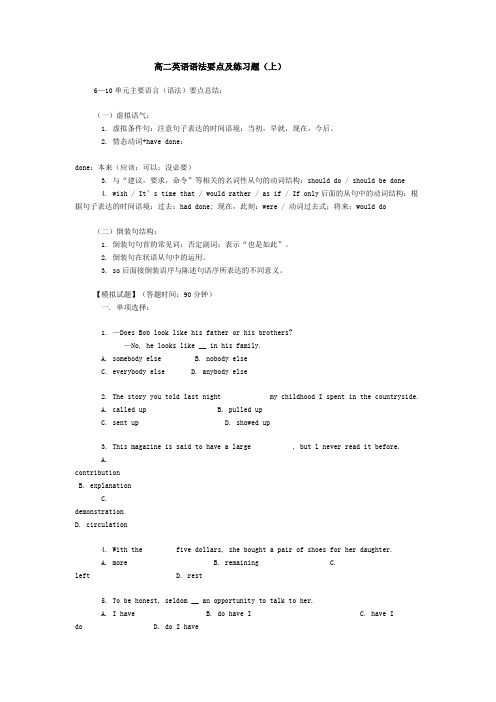
高二英语语法要点及练习题(上)6—10单元主要语言(语法)要点总结:(一)虚拟语气:1. 虚拟条件句:注意句子表达的时间语境:当初,早就,现在,今后。
2. 情态动词+have done:done:本来(应该;可以;没必要)3. 与“建议,要求,命令”等相关的名词性从句的动词结构:should do / should be done4. wish / It’s time that / would rather / as if / If only后面的从句中的动词结构:根据句子表达的时间语境:过去:had done; 现在,此刻:were / 动词过去式;将来:would do(二)倒装句结构:1. 倒装句句首的常见词:否定副词;表示“也是如此”。
2. 倒装句在状语从句中的运用。
3. so后面接倒装语序与陈述句语序所表达的不同意义。
【模拟试题】(答题时间:90分钟)一. 单项选择:1. —Does Bob look like his father or his brothers?—No, he looks like __ in his family.A. somebody elseB. nobody elseC. everybody elseD. anybody else2. The story you told last night my childhood I spent in the countryside.A. called upB. pulled upC. sent upD. showed up3. This magazine is said to have a large , but l never read it before.A.contributionB. explanationC.demonstrationD. circulation4. With the five dollars, she bought a pair of shoes for her daughter.A. moreB. remainingC.left D. rest5. To be honest, seldom __ an opportunity to talk to her.A. I haveB. do have IC. have Ido D. do I have6. What you said just now is of __ to the case.A. importantB. great importanceC. greatly importanceD. greatly important7. You can hardly imagine what difficulty I had __ with this problem.A. dealB. to dealC. dealingD. been dealing8. —Do come and have a talk with me whenever . OK?—No problem.A. you are convenientB. you feel convenientC. it is convenient to youD. it is convenient with you9. Be careful with that match, Jack. The cotton easily. Do you forget your last accident?A. burns downB. catches fireC. breaksdown D. takes place10. When again whether he agreed to our plan, he just ___ silent, sitting still.A. asking; keptB. asked; remainedC. being asked; leftD. was asked; stayed11. —Jack, why didn’t you come to Lucy’s party yesterday?—I , but a friend of mine came to see me yesterday.A. meanB. meant toC. meanto D. meant12. All the doctors of the world are trying their best to ___ AIDS that has caused thousands and thousands of people to die.A. wipe offB. wipe outC. wipe awayD. wipe up13. ___, they were determined to finish the work well and at the __ time.A. Feeling encouraging; planningB. Felt encouraged; plannedC. Feeling encouraged; plannedD. Felt encouraging; planning14. It was in the house __ he lived __ she found the lost gold necklace.A. where; whereB. where; thatC. that;where D. that; that15. He felt as if he alone ___ what had happened.A. be responsibleto B. should beresponsible toC. be responsiblefor D. were responsible for二. 完型填空:Two weeks before Christmas, mother told me we were going to my grandmother’s house for the holiday. Grandma and Uncle Henry lived on a farm some 15 miles out of town. They had no electricity or running water and __1__ what I considered the “good things” in life. They __2__ made no plans for Christmas. When Christmas Eve arrived, Mom told me in her best “I-mean-it” voice to __3__ all the decorations from our tree. She picked those up, along with all the trimmings (装饰物)for a complete turkey __4__.Christmas morning ___5__ perfectly, with the sun shining brightly across a fresh blanket of snow. ___6__ I sulked(生气)silently in the backseat of the car as we made our ___7__ to grandma’s. This was going to be the ___8__ Christmas ever! Grandm a was __9__ to see us as we walked up to her door. “What on earth are you doing here?” She stammered. “We weren’t expecting __10__. It’s Christmas, and I don’t even have a turkey to __11__ for you.” “I knew that,” Mom said as we set boxes of goodies on the kitchen table. “That’s __12__ we brought one with us.” “We must have a __13__,” Mom insisted. “__14__, what will we do with all these decorations?” Uncle Henry quickly caught Mom’s spirit. He called me to join him, and we __15__ a perfect Christmas tree in the woods. Soon the __16__ smelled fresh and piney as we decorated the tree, and the day __17__ a festival air. The turkey dinner was very good, too. I was actually beginning to enjoy this unusual Christmas Day!Dessert was forgotten __18__ Mom came out with the final surprise—a flaming pudding! “Merry Christmas, Mother,” Mom said, “Dear me!” Grandma gasped. “I haven’t seen a flaming pudding since I left England before I was married.” Tears of __19__ filled her eyes.I could not keep the tears rolling __20__ my eyes, either. I knew then that Mom had also given me the best Christmas present ever—she had taught me what a beautiful thing it is to give.1. A. prepared B. lacked C.refused D. desired2. A. also B. still C.never D. hardly3. A. replace B. collect C.remove D. show4. A. lunch B. dinner C.evening D. supper5. A. dawned B. passed C.broke D. happened6. A. But B. So C.And D. Then7. A. decision B. way C.wish D. plan8. A. last B. busiest C.best D. worst9. A. expected B. eager C.surprised D. ready10. A. anyone B. others C.someone D. no one11. A. give B. care C.cook D. wait12. A. how B. why C.where D. what13. A. pudding B. box C.turkey D. tree14. A. Meanwhile B. Therefore C.However D. Otherwise15. A. found B. accepted C.received D. searched16. A. flower B. house C.family D. day17. A. showed up B. carried on C. tookon D. lighted up18. A. until B. after C.because D. unless19. A. sadness B. joy C.regret D. worry20. A. inside B. back C.into D. from三. 阅读理解:AIt was at least two months before Christmas when nine-year-old Almie Rose told her father and me that she wanted a new bicycle. As Christmas drew near, her desire for a bicycle seemed to fade, or so we thought. We bought the latest rages. Baby-Sitter’s Club dolls, and a doll house. Then, much to our surprise, on December 23rd, she said that she “really wanted a bike more than anything else.”It was just too late, what will all the details of preparing Christmas dinner and buying last-minute gifts, to take the ti me to select the “right bike” for our little girl. So here we were—Christmas Eve around 9:00 p.m., with Almie and her six-year-old brother, Dylan, nested snug in their beds. Now we could only think of the bicycle and the disappointment of our child.“What if the bicycle out of clay(a kind of earth)and write a note that she could trade the clay model in for a real bike?” her dad asked. “This is an expensive item and she is ‘such a big girl,’ and it would be much better for her to pick it out.” So he spent th e next four hours painstakingly working with clay to make a tiny bike.On Christmas morning, we were excited for Almie to open the little heart-shaped package with the beautiful red and white clay bike and the note. Finally, she opened it and read the note aloud. “Does this mean that I trade in this bike that Daddy made me for a real one?” Beaming, I said, “Yes.” Almie had tears in her eyes when she replied, “I could never trade in this beautiful bicycle that Daddy made me. I’d rather keep this than ge t a real bike.” At that moment, we would have moved heaven and earth to buy every bicycle on the planet!1. Which is the right time order of the following events ?A. The girl asked for a new bikeB. The girl opened the little heart-shaped packageC. The parents bought the girl a modern and popular doll.D. The father made the girl a bike with clay.E. The girl would rather keep the clay bike than get a real one.F. A , b , c , e , d B. a , c , d , b , e C. a , c , b , d , e D. a , b , d , c , e2. Which of the following statements is TRUE according to the passage?A. The parents wanted the girl to have the clay bike forever.B. Tears were in the girl’s eyes because she didn’t like the present at all.C. The girl never lost her desire for a bike.D. The parents paid little attention to the daughter’s desire for a bike.3. Why did Dad make the clay bicycle ?A. Because he wanted to buy a real one, but he had no money.B. Because he didn’t want to disappoint his daughter.C. Because he thought his daughter would like it.D. Because he wanted to give his daughter a surprise.4. What can be inferred from the last sentence of the text ?A. The parents were happy and encouraged.B. The parents felt comfortable and relaxed.C. The parents were moved and felt proud of the girl.D. The parents felt disappointed and sorry for the girl.BTo Treat Every Day as the Last Day of Your LifeEvery day I feel dull and boring until one day I had a conversation with one of my best friends.She is an extraordinary common girl with plain appearance but weird thoughts sometimes.When I told all my boring feelings to her, she kept silent at first. Then she asked me: “If today is the last day of your life, What will you do ?”I was dumb at all. Just at that moment, she voiced her opinion: “I would contact my ex-boy friend and try to remedy the faults done by me before.“Wow, to love only if you are limited and to achieve onl y if you are restricted. Most of us have formed the habit of procrastination(拖沓). We take everything for granted too easily. But what shall we do and how regretful we will be if today happens to be the last day of our lives?”My friend has already gone to do her business when I came to consciousness. Yes, to treat every day as the last day your life, then you will, at least, have less to be pitied.1. What kind of person is the author’s friend ?A. She is an ordinary girl with a quick mind.B. She is a common girl with a kind heart.C. She is a girl who often helps others.D. She is a girl who has an active attitude to life.2. The underlined word “remedy”(paragraph 4)means ______.A. explainB. correctC.continue D. limit3. The author’s friend told her to _____.A. love her boy friend.B. dare to love, dare to achieveC. correct her mistakesD. have pity for herself.4. Why was the author dumb when she heard what her friend had said ?A. She was afraid of facing her last day of her life.B. She was too frightened by what her friend had said.C. She had never thought of such a philosophical question.D. She was regretful for what she had done.5. This passage mainly tells us that ____.A. We should live actively every day.B. Everybody has his last day of life.C. We should get rid of the habit of procrastination.D. We should take everything for granted easily.CWhy should we have good table manners ? They make eating more pleasant. None of us, for example, really want to watch another person chew food with his mouth open. So here are a few easy rules to get you through any meal without displeasing your table mates.1. Put your napkin on your lap as soon as you sit down and leave it beside your plate when you have finished eating.2. Sit up straight. It will help you digest your food, and it’s polite.3. When you are a guest, take a small portion of everything that is served. Your parents may not expect you to eat something you don’t like, but others will expect you to take a small portion. No one will say anything if you don’t finish it.4. Use your napkin on your mouth after eating solid food and before drinking liquids.5. Say “please” and “Thank you” when asking someone to pass you something. Pass food without delay to others.6. Don’t chew food with your mouth open. This also means not talking with your mouth full.7. Don’t announce that you hate a certain food. Someone worked hard to prepare it and won’t appreciate hearing this.8. Don’t wave yo ur eating utensils(用具)around when you are eating or are resting between bites. Put them on your plate.9. Cut food into small pieces, one piece at a time. Only babies have their food cut up at once—and their parents only do that to save time.10. Ask to be excused when you are ready to leave the table.1. When you have finished eating, ____.A. you should say goodbye to others.B. you should put the napkin beside your plate.C. you should say sorry.D. you can go home immediately.2. If you are invited to dinner, _____.A. you should eat your favorite food only.B. you had better taste every kind of the food.C. you should listen to your parents.D. you can sit as you like.3. According to the passage, which of the following is NOT true ?A. Before drinking liquids, you should use your napkin on your mouth.B. It’s bad manners to hold your bowl or glass in your hand and shake them.C. You should pass something to others before you ask them to pass you what you want.D. You shouldn’t cut your food into small pieces all at once unless you are a very little child.DBeauty has always been regarded as something praiseworthy. Almost everyone thinks attractive people are happier, have better marriages and have more respectable jobs. Personal advisors give them better advice for finding jobs. Even judges are softer on attractive defendants. But in the executive(主管的)circle, beauty can become a liability.While attractiveness is a positive factor for a man on his way up the executive ladder, it is harmful to a woman.Handsome male executives were considered as having more honesty than plainer men, effort and ability were thought to lead to their success.Attractive female executives were considered to have less honesty than unattractive ones; their success was connected not with ability but with factors such as luck.All unattractive women executives were thought to have more honesty and to be more capable than the attractive female executives. Interestingly, though, the rise of the unattractive overnight successes was connected more to personal relationships and less to ability than that of the attractive overnight successes.Why are attractive women not thought to be able? An attractive woman is considered to be more feminine and an attractive man more manly than the less attractive ones. Thus, an attractive woman has an advantage in traditionally female jobs, but an attractive woman in a traditionally manly position appe ars to lack the “manly” qualities required.This is true even in politics. “When the only clue is how he or she looks, people treat men and women differently,” say Anne Bowman, who recently published a study on the effects of attractiveness on political candidates(候选人). She asked 125 undergraduate students to rank two groups of photographs, one of men and one of women, in order of attractiveness. The students were told the photographs were of candidates for political offices. They were asked to rank them again, in the order they order they would vote for them..The results showed that attractive males completely defeated unattractive men, but the women who had ranked most attractive unchangeably received the fewest vote.1. The word “liability” most probably means_____.A. disadvantageB. advantageC. misfortuneD. trouble2. In traditionally female jobs, attractiveness ______.A. makes women look more honest and capableB. strengthens the feminine qualities requiredC. is of great importance to womenD. often enables women to succeed quickly3. Bowman’s experiment shows that when it comes to politics, attractiveness _____.A. turns out to be a disadvantage to menB. is more of a disadvantage than an advantage to womenC. affects men and women alikeD. had as little effect on men as on women4. It can be inferred from the passage that people’s views on beauty are often _____.A. practicalB. supportiveC.old-fashioned D. one-side5. The author writes this passage to ______.A. give advice to job-seekers who are attractiveB. discuss the disadvantages of being attractiveC. demand equal rights for womenD. state the importance of appearance四. 短文改错:Mrs. Smith was standing at her gate, looking out, whileshe 1______saw a truck and a big car hit each other. She ran in to help 2______ There was only one man in the truck and one womanin the car and none of them washurt, 3______ and the car wasdestroyed.4______The lady looked frightening and her hands wereshaking, 5______so Mrs. Smith invited him into her house and gaveher 6______some tea. She drinks thetea 7_ _____and quickly looked far better. Then she said to Mrs.Smith, 8______“Have you got a telephone, please? I would like to telephone 9______ my husband. Every time I will havetrouble, 10______I would telephone him.”五. 书面表达:写一篇短文描述你的叔叔对76年7月地震时的感受。
高二英语语法知识点总结归纳5篇分享
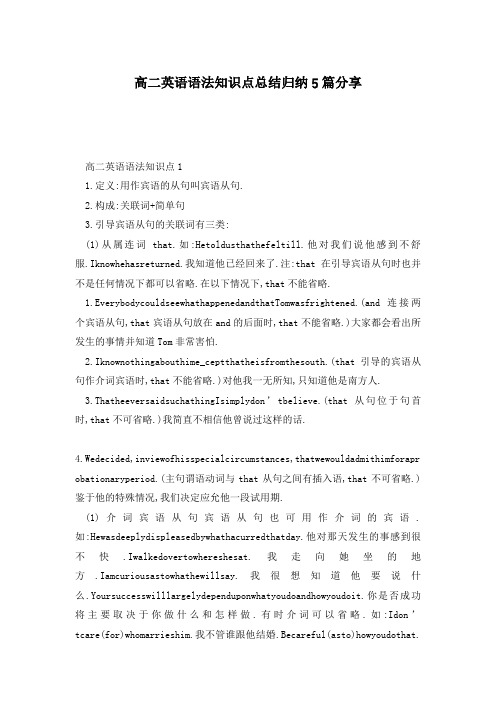
高二英语语法知识点总结归纳5篇分享高二英语语法知识点11.定义:用作宾语的从句叫宾语从句.2.构成:关联词+简单句3.引导宾语从句的关联词有三类:(1)从属连词that.如:Hetoldusthathefeltill.他对我们说他感到不舒服.Iknowhehasreturned.我知道他已经回来了.注:that在引导宾语从句时也并不是任何情况下都可以省略.在以下情况下,that不能省略.1.EverybodycouldseewhathappenedandthatTomwasfrightened.(and连接两个宾语从句,that宾语从句放在and的后面时,that不能省略.)大家都会看出所发生的事情并知道Tom非常害怕.2.Iknownothingabouthime_ceptthatheisfromthesouth.(that引导的宾语从句作介词宾语时,that不能省略.)对他我一无所知,只知道他是南方人.3.ThatheeversaidsuchathingIsimplydon’tbelieve.(that从句位于句首时,that不可省略.)我简直不相信他曾说过这样的话.4.Wedecided,inviewofhisspecialcircumstances,thatwewouldadmithimforapr obationaryperiod.(主句谓语动词与that从句之间有插入语,that不可省略.)鉴于他的特殊情况,我们决定应允他一段试用期.(1)介词宾语从句宾语从句也可用作介词的宾语.如:Hewasdeeplydispleasedbywhathacurredthatday.他对那天发生的事感到很不快.Iwalkedovertowhereshesat.我走向她坐的地方.Iamcuriousastowhathewillsay.我很想知道他要说什么.Yoursuccesswilllargelydependuponwhatyoudoandhowyoudoit.你是否成功将主要取决于你做什么和怎样做.有时介词可以省略.如:Idon’tcare(for)whomarrieshim.我不管谁跟他结婚.Becareful(asto)howyoudothat.你要注意做这件事的方式.(2)从属连词if/whether.如:Idoubtwhetherhewillsucceed.我怀疑他是否会成功.Idon’tknowifyoucanhelpme.我不知道你能否帮助我.(3)连接代词who,whom,whose,what,which,whoever,whatever,whichever连接副词where,when,how,why.如:Whoorwhathewas,Martinneverlearned.他是什么人?他是干什么的?马丁根本不知道.Iwonderwhathe’swritingtomeabout.我不知道他要给我写信说什么事.I’lltellyouwhyIaskedyoutocome.我会告诉你我为什么要你来.Youmaydowhatyouwill.你可做任何你想做的事.高二英语语法知识点2【现在完成进行时】1. 现在完成进行时的定义现在完成进行时表示某动作从过去某个时间开始,一直延续到现在,并且还有可能持续下去.如:We have been waiting for him for two hours. 我们等他等了两个小时. 2. 现在完成进行时的结构现在完成进行时由〝have /has been + 现在分词〞构成.3. 现在完成进行时的应用现在完成进行时所用的时间状语:this month / week / year, these days, recently / lately, inthe past few + 时间段, since +时间点, for + 时间段.如:They have been building the bridge for two month. 两个月来他们一直在修桥.They have been planting trees this month. 这个月来他们一直在植树. 4. 现在完成进行时与现在完成时的区别(1) 现在完成时强调动作的完成,而现在完成进行时强调动作的延续,因此,表示动作的完成,只能用现在完成时,而不能用现在完成进行时.如:He has changed his idea. 他改变了想法.(2)在表示动作的延续时,虽然既可用现在完成时,也可用现在完成进行时,但现在完成进行时强调动作的进行.因此在需要明确表示动作还要持续下去时,应用现在完成进行时.如:We have been studying here for two years. 我们在这儿已经学习了两年了.(3) 有些延续性动词(如 keep, learn, live, stay, study,work等),用于现在完成时或现在完成进行时的区别不大.如:I have lived here for many years.=I have been living here for many years.我在这儿住了多年了.高二英语语法知识点3副词什么是副词? 指出句中的副词: 1. You are standing near the camera.. Can you movea little farther? a little修饰副词〝farther〞表示程度 farther修饰动词〝move〞表示方式 2. Miss Longusually goes to school by bus. usually修饰动词goes,表示频度.频率 3. The two oldpassengers fell into the sea. Unfortunately, neither of them could swim.Unfortunately修饰整个句子 4. I won’t go with you. It’s much too hot today. muchtoo修饰形容词,表示程度修饰形容词hot,修饰形容词高二英语语法知识点4省略Ⅰ.状语从句中的省略用法以if从句为代表的状语从句中的特殊省略用法:通常省略了it is,that is,there is/are.Ⅱ.定语从句中的省略用法关系词的省略关系代词that,which,whom等在限制性定语从句中充当宾语且不位于介词之后时,可以省略;inwhich或that在先行词way后作方式状语从句时可省略.Ⅲ.虚拟语气中if及should的省略1. 当条件状语从句中有were,had,should等时省略if,把它们提至句首,形成倒装句.2.Suggest,insist,order,require等表示建议.要求.命令的动词后接的名词性从句中,谓语动词常用〝should+动词原形〞,should可以省略.Ⅳ.不定式符号to的省略1. 感官动词see,hear,feel,watch等和使役动词have,make,let等后接不定式作宾语时,不定式省略to.2.在特定语境中为了避免重复,当不定式再次出现时,在want,wish,hope,try,plan,like,love,hate后往往只保留to,而省略后面的动词.但不定式后有be,have时,也保留be和have.Ⅴ.So和not的替代性省略用于避免重复前面所说过的内容,替代词so/not替代肯定或否定的名词性从句.可与believe,do,e_pect,fear,guess,hope,say,speak,suppose,think,I’mafraid等连用高二英语语法知识点5介词又叫前置词,是一种虚词.介词分为三种,一种是简单介词,如 at, in, on, beside, to , for 等;另一种是短语介词,即由两个以上的词组组成的短语,infront of, because of, out of, instead 如 of 等;还有一种二重介词,如 until after, from behind等.(一) 介词的句法功能:介词不能独立在句中做成份,介词后必须与名词.代词.或动名词构成介词短语在句中充当一个成份,表示人.物.事件等与其它人.物.事件等之间的关系.1. 作定语: The book on the table is mine.2. 作状语: have breakfast at seven. We (表时间)They were late for meeting becauseof the heavy ; rain.(表原因) ;They started the machine by pressing thebutton.(表方法)3. 作表语: My dictionary is in the bag.4. 作宾语补足语: I found him in the office.(二) 1.表示时间的介词(1)in表示〝在某一时间段〞或〝在某一时候〞,如用在月.季.年份.时代.世纪等时间名词的前面,或用来泛指一天的某一段时间.in也可以指〝在……之后〞,表示从说话起的若干时间内.如: in July/summer/_/ancient timesThe bus will be here in ten minutes.(2) on表示〝在特定的某一天〞,也可用于带有修饰语的一天的某个时间段之前.如:on Saturday, on Saturday morning,on the morning of August 1st(3) at表示〝在某一时间点〞,或用来表示不确定的时间和短期的假日.时节等.如:at si_ o clock, at Easter(4) over, through (out)两者均指〝经过的全部时间〞.如:Stay over the Christmas.(5)for与since:for表示动作或状态延续的全部时间长度,为〝长达……〞之意;since用于指从过去特定的某个时刻到说话时为止的一段时间;含有since时间短语的句子要用完成时,但含有for时间短语的句子不一定要用完成时.最新高二英语语法知识点总结归纳5篇分享。
高二英语语法知识点总结5篇
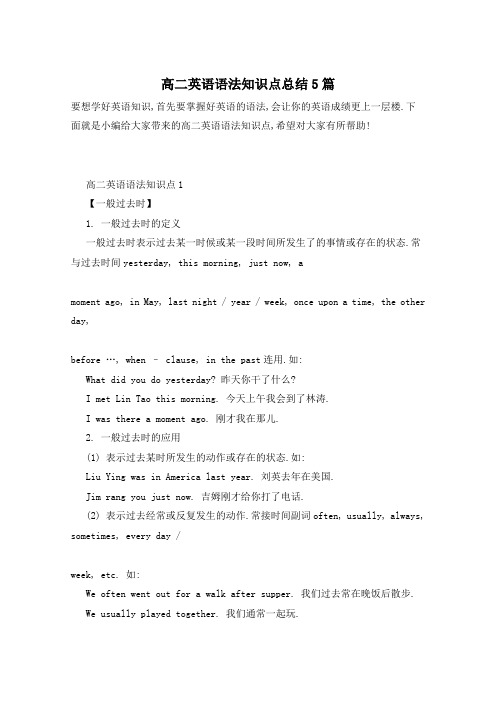
高二英语语法知识点总结5篇要想学好英语知识,首先要掌握好英语的语法,会让你的英语成绩更上一层楼.下面就是小编给大家带来的高二英语语法知识点,希望对大家有所帮助!高二英语语法知识点1【一般过去时】1. 一般过去时的定义一般过去时表示过去某一时候或某一段时间所发生了的事情或存在的状态.常与过去时间yesterday, this morning, just now, amoment ago, in May, last night / year / week, once upon a time, the other day,before …, when – clause, in the past连用.如:What did you do yesterday? 昨天你干了什么?I met Lin Tao this morning. 今天上午我会到了林涛.I was there a moment ago. 刚才我在那儿.2. 一般过去时的应用(1) 表示过去某时所发生的动作或存在的状态.如:Liu Ying was in America last year. 刘英去年在美国.Jim rang you just now. 吉姆刚才给你打了电话.(2) 表示过去经常或反复发生的动作.常接时间副词often, usually, always, sometimes, every day /week, etc. 如:We often went out for a walk after supper. 我们过去常在晚饭后散步. We usually played together. 我们通常一起玩.3. 一般过去时对谓语动词的要求[page]一般过去时的谓语动词要用动词的过去式.动词过去式的构成分规则变化和不规则变化两种形式,不规则变化通常需要逐个记忆,规则变化则遵循以下原则:(1) 一般在动词后加-ed.如:play—played, offer—offered, weigh—weighed, destroy—destroyed, sign—signed.(2) 在以字母e结尾的动词后,只加-d.如:like—liked, provide—provided, hate — hated,date—dated.(3) 在以〝辅音字母+y〞结尾的动词后,则改y为i,再加—ed.如:supply—supplied, fly—flied, study—studied.(4) 在以单短元音的重读闭音节结尾且,末尾只有一个辅音字母的动词后,双写最后一个辅音字母,再加-ed.如:plan—planned,refer—referred, regret—regretted, ban—banned.4. 特别说明有些动词的过去时,如:e_pect, hope, intend, plan, wanted等一般过去时,后接不定式的完成时;或它们的过去完成时接不定式的一般式,都可表示过去未曾实现的意图.打算或希望.如:I hoped to have been invited to his wedding party. —I had hoped to beinvited to his wedding ceremony. 我本希望他来邀请我参加他的婚礼.I intended to have joined their games. —I had intended to join their games.我本打算参加他们的比赛.高二英语语法知识点2常用介词区别 1.at 如:常用词组有: at noon, at night 表示时间的 at, in, on:表示片刻的时间,at 8o’clock,at midnight, at the end of, at that time, at the beginning of, at theage of, at Christmas, at New Year 等. in 表示一段的时间如:in the morning, in theafternoon, in the evening, in October, in _98, in summer, in the past, in thefuture 等. on 总是跟日子有关,on Monday, on Christmas morning, on the following, on MayDay, on a warm morning 等. 2.表示时间的 since 和 from:since表示从过去到现在的一段时间的过程,常与现在完成时连用:from 表示从时间的某一点开始,不涉及与现在的关系.一般多与现在时.过去时.将来时连用. 如:Ihope to do morning e_ercises from today./ We have not seen each other since_95. 3.表示时间的 in 和 after:两者都表示〝在(某个时间)之后,区别在于in表示〝在(一段时间)之后〞 ,而 after则表示〝在(某一具体时间点之后),in 短语和将来时态连用,after 短语和过去时态或将来时态连用. 如:We’ll be back in threedays. After seven the rain began to fall. What shall we do after graduation?After two months he returned. 注意:after 有时也可以表示在一段时间之后(常用在过去时里) 4.表示地理位置的 in,on, to:in 表示在某范围内,on 指与什么毗邻,to 指在某环境范围之外如:Changchun is in the northeast ofChina./ Mongolia is on the north of China./ Japan is tothe east of China.5.表示〝在……上〞的 on 和 in:on 只表示在某物的表面上,而用 in 表示占去某物一部分,表示……上. 如:There is a bookon the piece of paper./ There is an interesting article in the newspaper./ Hedug a hole in the wall. 高二英语语法知识点归纳:介词介词又叫前置词,是一种虚词. 介词分为三种,一种是简单介词,如 at,in, on, beside, to , for 等;另一种是短语介词,即由两个以上的词组组成的短语,in front of, because of, outof, instead 如 of 等;还有一种二重介词,如 until after, from behind 等.(一)介词的句法功能:介词不能独立在句中做成份,介词后必须与名词.代词.或动名词构成介词短语在句中充当一个成份,表示人.物.事件等与其它人.物.事件等之间的关系.1. 作定语: The book on the table is mine.2. 作状语: have breakfast at seven. We(表时间)They were late for meeting because of the heavy ; rain.(表原因) ;They startedthe machine by pressing the button.(表方法) 3. 作表语: My dictionary is in the bag.4. 作宾语补足语: I found him in the office. (二) 1.表示时间的介词 (1)in表示〝在某一时间段〞或〝在某一时候〞,如用在月.季.年份.时代.世纪等时间名词的前面,或用来泛指一天的某一段时间.in也可以指〝在……之后〞,表示从说话起的若干时间内.如: in July/summer/2000/ancient times The bus will be here in ten minutes.(2) on表示〝在特定的某一天〞,也可用于带有修饰语的一天的某个时间段之前.如:on Saturday, on Saturday morning, onthe morning of August 1st (3) at表示〝在某一时间点〞,或用来表示不确定的时间和短期的假日.时节等. 如:at si_o clock, at Easter (4) over, through (out)两者均指〝经过的全部时间〞. 如:Stay over theChristmas. (5)for与since:for表示动作或状态延续的全部时间长度,为〝长达……〞之意;since用于指从过去特定的某个时刻到说话时为止的一段时间;含有since时间短语的句子要用完成时,但含有for时间短语的句子不一定要用完成时.高二英语语法知识点归纳:形容词 1.形容词的定义:形容词简称adv. 形容词简称adv.修饰v.adj.,其他adv.或全句的词,v.,adv.或全句的词修饰v.,adj.,其他adv.或全句的词,表示时间,地点,程度,方式等.表示时间,地点,程度,方式等. 2.复合形容词的构成 (1)形容词+ 名词+ ed kind-hearted 好心的,white-haired 白发的(2)形容词+ 形容词red-hot 炽热的,dark-blue 深蓝的 (3)形容词+ 现在分词good-looking 好看的,easy-going随和的 (4)副词+ 现在分词hard-working 勤劳的,fast-moving 快速转动的 (5)副词+ 过去分词hard-won得来不易的,newly-made 新建的 (6)名词+ 形容词life-long 终生的,world-famous 世界闻名的 (7)名词+现在分词peace-loving 爱好和平的,fun-loving 爱开玩笑的 (8)名词+ 过去分词snow-covered白雪覆盖的,hand-made 手工的 (9)数词+ 名词+ ed four-storeyed 4 层楼的,three-legged 3 条腿的(10)数词+ 名词(名词用单数)ten-year 10 年的,two-man 两人的高二英语语法知识点3主谓一致1.以单数名词或代词.动词不定式短语作主语时,谓语动词要用单数;主语为复数时,谓语用复数.(最基本的)2.由and或both……and连接的并列成分作主语时,谓语动词用复数.但并列主语如果指的是同一人.同一事物或同一概念,谓语动词用单数.3.由and连接的并列单数主语之前如果分别由each, every, no修饰时,其谓语动词要用单数形式.4.主语是单数时,尽管后面跟有 but ,e_cept, besides, with ,as wellas ,together with,along with,like 等引导的介词短语时 ,谓语动词与前面的主语一致.注意:主语和谓语之间插入了分词短语,谓语要与主语保持一致.5.一些只有复数形式的名词,如people, police, cattle, clothes等作主语时,谓语动词要用复数.6.集体名词family, class, team, group 等看作整体时,谓语动词用单数;看作每一个成员时,谓语动词用复数.7. 当表示国家,城市,人名,书名,报纸,杂志,及组织机构等的专有名词做主语时,作为整体,谓语动词用单数形式.The New York Times is reading all over the United States . 《纽约时报》8. news ,maths,physics ,politics等词貌似复数,实为单数,其谓语动词用单数.9.〝the +形容词〞(如the poor ,the rich ,the young, the old , the dead ,thesick,the brave 等)作主语,谓语动词往往用复数10.表时间.距离.价格.度量衡等的名词作主语时,谓语动词通常用单数._.由连词not……but……, or, either……or, neither……nor, not only…butalso,等连接的并列主语,如果一个是单数,一个是复数,则谓语动词按就近一致原则,与最靠近它的主语一致.(这个就是就近原则)_.There be句型.以here开头的句子谓语动词和靠近的主语一致._.a number of后面加复数名词或代词,其动词用复数形式;但the number of 后面加复数名词或代词时,其谓语用单数._.在定语从句中主语是关系代词who , that , which , 谓语动词的数应与先行词的数一致.注意在〝one of +复数名词+ who/that/which〞引导的定语从句中,从句谓语的单复数取决于one前是否有the (only).thevery.如果有,从句的谓语动词用单数,如没有the only, 就用复数形式.高二英语语法知识点41.at如:常用词组有: at noon, at night表示时间的 at, in, on:表示片刻的时间,at 8 o’clock,at midnight, at the end of, at thattime, at the beginning of, at the age of, at Christmas, at New Year 等.in 表示一段的时间如:in the morning, in the afternoon, in the evening, in October, in _98, insummer, in the past, in the future 等.on 总是跟日子有关,on Monday, on Christmas morning, on the following, on May Day,on a warm morning 等.2.表示时间的 since 和 from:since 表示从过去到现在的一段时间的过程,常与现在完成时连用:from表示从时间的某一点开始,不涉及与现在的关系.一般多与现在时.过去时.将来时连用.如:I hope to do morning e_ercises from today./ We have not seen each othersince _95.3.表示时间的 in 和 after:两者都表示〝在(某个时间)之后,区别在于in表示〝在(一段时间)之后〞 ,而 after则表示〝在(某一具体时间点之后),in 短语和将来时态连用,after 短语和过去时态或将来时态连用.如:We’ll be back in three days.After seven the rain began to fall.What shall we do after graduation?After two months he returned. 注意:after 有时也可以表示在一段时间之后(常用在过去时里)4.表示地理位置的 in, on, to:in 表示在某范围内,on 指与什么毗邻,to 指在某环境范围之外如:Changchun is in the northeast of China./ Mongolia is on the north ofChina./ Japan is tothe east of China.5.表示〝在……上〞的 on 和 in:on 只表示在某物的表面上,而用 in 表示占去某物一部分,表示……上.如:There is a book on the piece of paper./ There is an interesting articlein the newspaper./ He dug a hole in the wall.高二英语语法知识点51.定义:用作表语的从句叫做表语从句.2.构成:关联词+简单句3.引导表语从句的关联词的种类:(1)从属连词that.如:ThetroubleisthatIhavelosthisaddress.麻烦是我把他的地址丢了.(2)从属连词whether,as,asif.如:Helookedjustashehadlookedtenyearsbefore.他看起来还与十年前一样.Thequestioniswhethertheywillbeabletohelpus.问题是他们是否能帮我们.注:从属连词if一般不用来引导表语从句,但asif却可引导表语从句,如:Allthiswasovertwentyyearsago,butit sasifitwasonlyyesterday.这都是20多年前的事了,但宛如昨天一样.能跟表语从句的谓语动词一般为系动词be,seem,look等.如:Itlookedasifitwasgoingtorain.看起来天要下雨了.(3)连接代词who,whom,whose,what,which,whoever,whatever,whichever连接副词where,when,how,why.如:Theproblemiswhowecangettoreplaceher.问题是我们能找到谁去替换她呢.Thequestionishowhedidit.问题是他是如何做此事的.Thatwaswhatshedidthismorningonreachingtheattic.那就是她今晨上了阁楼干的.解释:1.连词because可引导表语从句.如:Ithinkitisbecauseyouaredoingtoomuch.我想这是因为你做得太多.2.在一些表示〝建议.劝说.命令〞的名词后面的表语从句中,谓语动词用虚拟语气.should+动词原形表示,should可省略.如:Mysuggestionisthatwe(should)startearlytomorrow.我的建议是我们明天一早就出发.高二英语语法知识点总结5篇。
高二上英语语法知识点

高二上英语语法知识点英语语法是学习英语的基础,掌握了语法知识点,可以帮助我们更好地理解和运用英语。
以下是高二上学期英语语法知识点的详细介绍:一、时态1. 一般现在时一般现在时表示经常性的动作、客观事实或普遍真理。
例如:I go to school every day.2. 现在进行时现在进行时表示现阶段正在进行的动作。
例如:She is reading a book at the moment.3. 一般过去时一般过去时表示过去某个时间发生的动作。
例如:They visited their grandparents last month.4. 过去进行时过去进行时表示过去某个时间正在进行的动作。
例如:I was watching TV when he called me.5. 一般将来时一般将来时表示将来某个时间将会发生的动作。
例如:Wewill travel to Europe next summer.6. 现在完成时现在完成时表示过去发生并且和现在有关的动作。
例如:He has already finished his homework.二、被动语态被动语态是英语中常用的一种语态形式,用来表示句子的主语是动作的承受者。
被动语态的构成是“am/is/are + 过去分词”。
例如:The book is written by Mark Twain.三、虚拟语气虚拟语气用来表示与事实相反的假设情况,包括虚拟条件句和虚拟假设句。
例如:If I were you, I would go to the party.四、定语从句定语从句用来修饰名词,起到进一步说明的作用。
定语从句通常由关系代词引导,包括that, who, whom, whose, which等。
例如:The girl who is wearing a red dress is my sister.五、名词性从句名词性从句在句中充当名词的角色,可以作主语、宾语、表语等。
高中生高二英语重点知识点总结8篇

高中生高二英语重点知识点总结8篇篇1一、英语语法重点知识点1. 从属连词:高中英语中,从属连词是重要的语法点,用于引导从句,表明主从句之间的从属关系。
常见的从属连词有that、which、who、whom、whose、when、where、why等。
2. 虚拟语气:虚拟语气是一种非真实条件句,用于表达与过去或现在事实相反的情况。
在英语中,虚拟语气有三种形式:简单过去式、过去进行式、过去完成式。
3. 非谓语动词:非谓语动词包括不定式、动名词和分词。
它们在句子中作状语、定语、宾语等,起到连接句子、描述动作的作用。
4. 从句:从句是英语中一种复杂的句子结构,包括主语从句、宾语从句、表语从句和同位语从句等。
它们在句子中起到解释、说明、补充的作用。
1. 常用动词及短语:掌握常用动词及短语的意义和用法,如“break down”、“get away”、“take off”等,这些动词和短语在英语中具有丰富的表达力和灵活性。
2. 形容词和副词:形容词和副词是英语中重要的词汇类别,用于描述动作的状态和程度。
要掌握常见形容词和副词的意义和用法,如“beautiful”、“quickly”等。
3. 介词和连词:介词和连词在英语中起到连接句子、描述动作的作用。
要掌握常见介词和连词的意义和用法,如“in”、“on”、“at”、“because”等。
4. 固定短语和习语:固定短语和习语是英语中的常用表达方式,具有固定的结构和意义。
要掌握常见固定短语和习语的意义和用法,如“on the contrary”、“in other words”等。
三、英语阅读理解重点知识点1. 阅读理解技巧:掌握阅读理解的基本技巧,如预读、略读、跳读等,这些技巧可以帮助我们快速获取文章的主旨大意和关键信息。
2. 理解主旨大意:要能够理解文章的中心思想或主要观点,并能够用自己的话进行概括和表达。
3. 理解关键信息:要能够找出文章中的关键信息,如关键词、关键句等,并能够理解它们所表达的意思和作用。
高二英语语法必考知识点总结
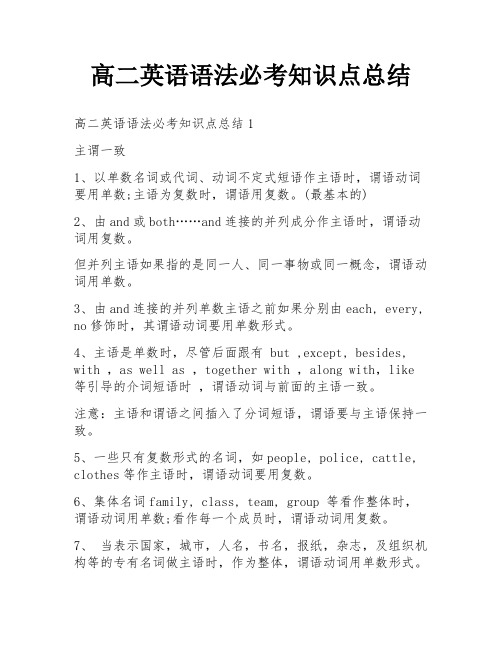
高二英语语法必考知识点总结高二英语语法必考知识点总结1主谓一致1、以单数名词或代词、动词不定式短语作主语时,谓语动词要用单数;主语为复数时,谓语用复数。
(最基本的)2、由and或both……and连接的并列成分作主语时,谓语动词用复数。
但并列主语如果指的是同一人、同一事物或同一概念,谓语动词用单数。
3、由and连接的并列单数主语之前如果分别由each, every, no修饰时,其谓语动词要用单数形式。
4、主语是单数时,尽管后面跟有 but ,except, besides, with ,as well as ,together with ,along with,like 等引导的介词短语时,谓语动词与前面的主语一致。
注意:主语和谓语之间插入了分词短语,谓语要与主语保持一致。
5、一些只有复数形式的名词,如people, police, cattle, clothes等作主语时,谓语动词要用复数。
6、集体名词family, class, team, group 等看作整体时,谓语动词用单数;看作每一个成员时,谓语动词用复数。
7、当表示国家,城市,人名,书名,报纸,杂志,及组织机构等的专有名词做主语时,作为整体,谓语动词用单数形式。
The New York Times is reading all over the United States . 《纽约时报》8、 news ,maths,physics ,politics等词貌似复数,实为单数,其谓语动词用单数.9、“the +形容词”(如the poor ,the rich ,the young, the old , the dead ,the sick,the brave 等)作主语,谓语动词往往用复数10、表时间、距离、价格、度量衡等的名词作主语时,谓语动词通常用单数。
11、由连词not……but……, or, either……or, neither……nor, not only…but also,等连接的并列主语,如果一个是单数,一个是复数,则谓语动词按就近一致原则,与最靠近它的主语一致。
高二英语知识点归纳语法知识点总结

高二英语知识点归纳语法知识点总结高二阶段的英语学习至关重要,语法知识的掌握对于英语能力的提升有着举足轻重的作用。
以下是对高二英语语法知识点的归纳总结。
一、非谓语动词非谓语动词包括动词不定式、动名词和分词(现在分词和过去分词)。
动词不定式具有名词、形容词和副词的特征,在句中可以作主语、宾语、定语、状语和宾语补足语。
例如:“To learn English well is not easy”(作主语);“I want to go shopping”(作宾语)。
动名词具有名词的特征,在句中可以作主语、宾语、定语和表语。
比如:“Swimming is my favorite sport”(作主语);“I enjoy reading”(作宾语)。
分词在句中可以作定语、状语、宾语补足语和表语。
现在分词表示主动和进行,过去分词表示被动和完成。
“The smiling girl is my sister”(作定语);“Seen from the top of the hill, the city looks beautiful”(作状语)。
二、虚拟语气虚拟语气用于表示与事实相反或难以实现的情况。
在条件状语从句中,如果表示与现在事实相反,从句用一般过去时,主句用“would / could / should +动词原形”;如果表示与过去事实相反,从句用过去完成时,主句用“would / could / should + have +过去分词”;如果表示与将来事实相反,从句用“should +动词原形”或“were to +动词原形”,主句用“would / could / should +动词原形”。
在宾语从句中,wish 后的宾语从句常用虚拟语气。
例如:I wish I were a bird(与现在事实相反);I wish I had studied harder(与过去事实相反)。
三、定语从句定语从句在句中起定语作用,修饰先行词。
- 1、下载文档前请自行甄别文档内容的完整性,平台不提供额外的编辑、内容补充、找答案等附加服务。
- 2、"仅部分预览"的文档,不可在线预览部分如存在完整性等问题,可反馈申请退款(可完整预览的文档不适用该条件!)。
- 3、如文档侵犯您的权益,请联系客服反馈,我们会尽快为您处理(人工客服工作时间:9:00-18:30)。
高二上学期英语语法总结Grammar focus语法重点1.Thesimplepassiveformof the infinitives.不定式被动态的一般形式的内涵及用法。
2.Four functions of the infinitives used assubject,attribute,object andadverbial.用作主语、定语、宾语和状语的不定式的四种功能的用法。
本单元的语法项目是不定式的被动式,具体讲解如下:①当不定式的逻辑主语是不定式所表示动作的承受者时,不定式一般用被动形式。
不定式被动形式在句中可作主语、表语、状语、补语等。
如:To be obeyed was naturalto her.她生性让别人听命于她。
(作主语)The problem remained to be solved.这个问题还有待解决。
(作表语) Itneeds notto besaid that they areveryhappy together.不必说他们在一起非常幸福。
(作宾语)There were plans tobemade at once.要立即制定计划。
(作定语)He has returned onlyto be sent awayagain.他回来以后又被打发走了。
(作状语)The captain ordered the flag to be hoisted.船长命令升旗。
(作宾语补足语)The book isintended to be readand not tobe torn.这书是供人阅读的而不是供人撕毁的。
(作主语补足语)②在某些句子中,不定式虽表被动,但仍用主动形式。
如:What is to pay?要付多少钱?Thereasonisnot far to seek.道理很浅显。
He gave me some books toread.他给了我一些书读。
Wefound the report easy to understand.我们发现这些报告很容易懂。
不定式作主语、定语、宾语和状语的功能和用法讲解如下:由于不定式有名词、形容词和副词的特点,所以它在句中可做主语、表语、宾语、定语、同位语、状语、补语等。
但由于时间关系,今天我只把不定式作主语、定语、宾语和状语的用法讲解一下。
1)作主语。
如:To see is to believe.眼见为实。
To serve the people is our duty.为人民服务是我们的职责。
在日常英语中,常用it作为语法上的主语,即形式主语,而将真正的主语放在后面。
It is our duty to servethepeople.为人民服务是我们的职责。
2)作宾语。
如:I couldn't afford to buy a new car.我买不起汽车。
Have you decidedto marryhim?你决定嫁给他吗?有些动词常常跟不定式作宾语,它们是:want,wish,hate,prefer,hope,continue,manage,try,ask,offer,start,forget,remember,begin,decide,agree,choose,learn,pretend,promise,mean,e xpect,desire等。
另外,在一些复合宾语中,常用it代表不定式作为形式宾语,而将真正的宾语不定式放在后面。
如:I thought itrightto do thistest.我认为做这项实验是对的。
3)作定语。
通常都置于被修饰名词或代词之后。
如:Thisis the bestway tosolvethisproblem.这是解决这个问题的最好办法。
I have a lotof work to do.我有许多工作要做。
如果不定式和它所修饰的词有逻辑上的动宾关系,且这个不定式是不及物动词,则它后面需有必要的介词。
如:He is a good comrade to workwith.他是一个很好共事的同志。
Thereisnothingto think about.没什么值得考虑的。
4)作状语,表示目的、结果、原因等。
如:He went home to seehis parents.他回家看望父母。
(表目的)I turned the radiodownso as not to disturb you.我把收音机音量调小,以免打扰你。
(表目的)Theproblem is too hard to understand.这问题太难了,理解不了。
(表结果)Whathave I done to make you unhappy?我做了什么事使你不高兴?(表结果)I'mglad tohearthe news.听了这消息,我很高兴。
(表原因)Iwas surprisedto see him there.我真想不到会在那里见到他。
(表原因)Grammar focus语法重点Thepast participle usedas attributeandpredicative用作定语和表语的过去分词本单元的语法项目是过去分词作定语、表语。
它们的用法讲解如下:1)过去分词作定语。
如果是及物动词的过去分词作定语,过去分词与被修饰词有逻辑上的被动关系,且表完成的状态;如果是不及物动词的过去分词作定语,过去分词与被修饰词在逻辑上没有主被动关系之说,所以不及物动词的过去分词只表完成的状态。
但有些表示思想感情的过去分词如astonished,disappointe d,excited,frightened,interested,pleased,surprised,tired,worried 等既不表主动,又不表完成。
此外,作定语的过去分词如果是单词,一般放在被修饰词的前面;作定语的过去分词如果是动词短语,一般放在被修饰词的后面。
如:We need more qualifiedteachers.我们需要更多的合格老师。
Hestepped carelesslyon some broken glass.他不小心踩到了碎玻璃上了。
Theletter writtenby my brother is onthe desk.我兄弟写的信在桌子上。
The TV set made inChina aregoodquality.中国制造的电视机质量很好。
You can drink boiledwater,not boiling water.你可以喝白开水,但不可以喝沸腾的水。
Fromhis disappointed look,I knewhedidn't passtheexam ination.从他的失望表情看,我知道他没通过考试。
2)作表语,过去分词作表语,多表示主语的状态。
如:This machine part is broken.这个机器零件坏了。
Helooked very excited.他看起来很激动。
有些过去分词实际上已被看成形容词了,常见的有:delighted,disappoin ted,discouraged,drunk,amused,astonished,hurt,interested,crowded,tired,satisfied,pleased,surprised,worried,exc ited,married,puzzled,upset等。
Grammar focus语法重点The Past Participle used as Object Complement用作宾补的过去分词本单元的语法项目是过去分词作宾补,你能把它的用法讲解一下吗?师:过去分词作宾补,与前面的宾语有逻辑上的被动关系且表动作的完成。
1)作表感觉或心理状态的动词的宾补,它们是:see,hear,watch,feel,find,think等We hearthe musicplayed bythe band.我们听了乐队演奏这首乐曲。
I foundhergreatly changed.我发现她变化很大。
Everybody thought the battle lost.人人都认为这场战役输掉了。
2)作使役动词的宾补,它们是:make,keep,leave,have,get,help等When you speak,you have to makeyourself understood.说话时要让人听懂。
Please keep us informed of the latest development.请随时向我们通报事态的最新发展。
I mustgetmy bike repaired.我必须请人修自行车。
3)作表希望或要求的动词的宾补,它们是:want,like,wish,prefer,need,declare,report,order,acknowledge等。
这种用法与不定式的被动形式作宾补基本相同。
Idon't want any ofyou(to be)involved inthescandal.我不要你们任何人牵涉到丑闻中去。
Theviewers wish the serial film(tobe)continued.观众们希望这部系列片继续下去。
She needs thework(to be)done before tomorrow.他要此项工程明天以前完成。
Grammarfocus语法重点ThePast Participleused asAdverbial用作状语的过去分词本单元课文中出现了许多过去分词作状语的句子,您能把这一语法现象讲解一下吗?师:无论过去分词作状语还是现在分词作状语,分词的逻辑主语都要和主句的主语一致。
过去分词与主句的主语应是被动关系。
过去分词作状语,表示时间、原因、让步或伴随等,这种过去分词通常相当于状语从句。
下面我将举例说明。
1)表时间(When the metal is)Heated,the metal expands.加热后,这种金属会膨胀。
(Thecouple took good care of thebaby while(the couple wa s)occupied by theirwork.这对夫妇一边工作,一边很好地照顾这个婴儿。
像第二句那样当强调实践概念时,过去分词之前可用连词when,while。
2)表原因(As he was)Greatly surprised,he couldn't say a word.他大吃一惊,一时说不出话来。
(Becauseshe was)Scolded by theteacher,thegirl felt unfair. 那姑娘因受老师责备,而愤愤不平。
